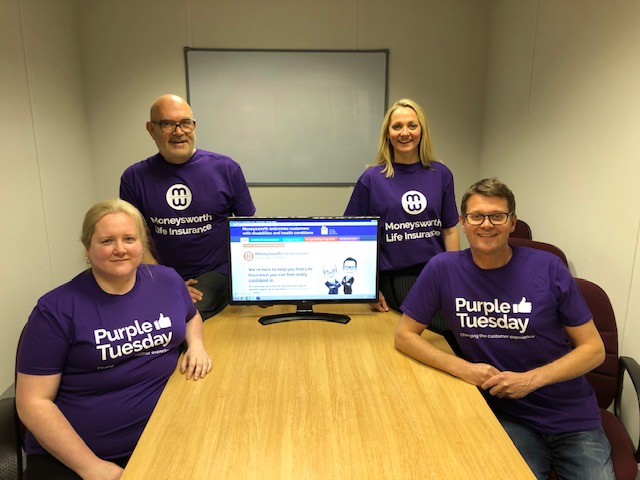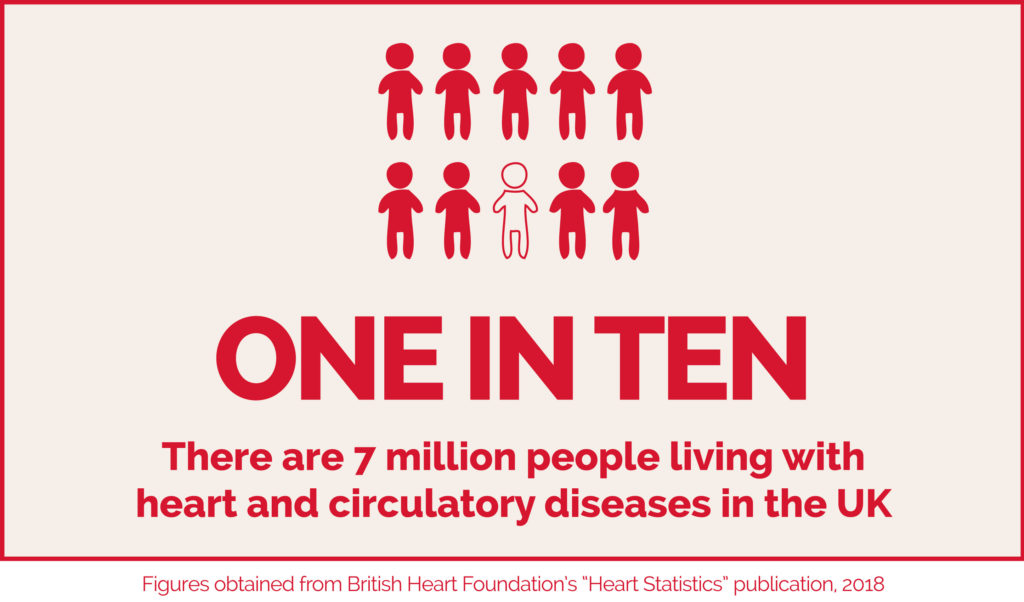Moneysworth wins Best Small Protection Advice Firm 2023!
Learn more
Call us 01625 462 744

We took part in last year’s event, and we’re proud to be doing so again today!
Purple Tuesday was started by the aptly named Purple, an organisation which also offers accessibility consultancy, training and auditing services. We like what they do, and earlier this year we signed up to become a member so we can learn how to make our business more inclusive.
At Moneysworth, our mission is to improve access to Life Insurance for people who have struggled to find cover they can afford or have been refused cover, usually because they’ve been deemed a higher risk due to an existing health condition.
For most Moneysworth clients, their first engagement with us is when they use our website.
We knew our website already had features that were built with accessibility in mind, such as fairly large font sizes, touch screen compatibility and menus that could be used with just a keyboard – but is that good enough? What other improvements should we add?
How would you find your way around a website if you have visual, motor or cognitive impairments? How would you click a link, open a menu or fill in a form if you can’t operate a mouse or you have difficulty seeing and reading?
When we asked ourselves these questions, we realised we didn’t have all the answers. So we asked Purple to audit our website.
Their report identified a number of ways we could improve what is “already a good site”, and it also identified where we could make improvements to provide an easier experience for people with visual impairments or physical disabilities.
Our web designer found optimum ways to implement these changes without radically changing the design of the Moneysworth site.
Going through this process has been an interesting and revealing exercise. Now that we’ve put these improvements in place, we’ll continue to ensure we consider maximum accessibility for all users as we add new content and features to the Moneysworth website.

Before and after: some of the visual usability improvements we made to our ‘Get a Quote’ form. Better spacing, larger ‘Required’ labels, buttons and checkboxes that can be navigated and switched on/off with the keyboard, and a more prominent presentation of the options the user has selected.

Our client was looking for life insurance to cover the mortgage on their family’s home. Due to the client’s mental health history (which included a significant event within the last five years), they had been declined cover by two major insurance companies.
“When I first applied for life insurance, being told by my initial advisor [name supplied] that my condition and medical history which had been caused by a hardship in my life would make it both difficult for me to obtain life insurance, and could potentially mean I can’t obtain life insurance was a real scare for me, and made me feel guilty for going through what I had gone through and trying to seek help during a tough period in my life. A period where I should have been excited and overjoyed buying a house with my partner was overlooked by more anxiety and worry that I wouldn’t be able to obtain life insurance to make sure the mortgage for my partner was sorted if I were to pass (which frankly I find really unfair).”
Feedback received from the client (June 2019)
The client approached Moneysworth for assistance. We spoke with the client about the details of their mental health history. Then we contacted underwriters at insurance companies across the market to ask how they might react if the client were to make an application to them. Some insurers stated that they would decline an application but others said they might consider offering the requested cover but at a cost of around 10 to 15 times greater than the normal standard premium rate (the monthly fee to be paid by the client for their insurance).
We explained to the client that the reason for the high premiums was due to the risk of suicide, based on their mental health history.
“After doing extensive research online, upon finding Moneysworth, they were one of the very last options for me, so after giving them a ring and discussing my situation, it was somewhat reassuring that I felt like I was not alone, and unlike my previous advisor they had my back. Had I of not found Moneysworth, I do not think I would have life insurance. I was told by someone on the phone from one insurance company [name supplied] to ‘not bother for around 5 years’.”
Feedback received from the client (June 2019)
We mentioned to the client that the Moneysworth team has been very concerned about outcomes like this. We’re aware of many cases of people in similar situations, in which insurers have declined to offer any Life Cover, or have told clients to come back to them in several years if their mental health circumstances improve.
“The thought of having to pay 10-15 times the normal premium for life insurance as a first time buyer with all my other bills to worry about felt unfair, as I have mentioned above. I don’t drink (expect for very special occasions), I don’t smoke, I stay fit and physically healthy. It felt like insurance companies were manipulating a hardship in my life that really took its toll on me and that I did not want to be reminded of. I didn’t do what I did in the past for the sake of it, it was a genuine time in my life where I struggled, and I think that insurance companies are failing to recognise this.”
Feedback received from the client (June 2019)
We also explained that, at the time, Moneysworth had recently begun a trial scheme with a mainstream insurance company Royal London, which aimed to give such clients the possibility of obtaining the Life insurance they were seeking with a premium which clients would deem to be significantly more affordable. This new Life Cover option achieves this by excluding self-inflicted death for the term of the policy. The client was willing to accept this exclusion, and decided they would like to apply.
We made the application to Royal London with the client. The insurer contacted the client’s GP for a medical report. They then made the decision to offer life insurance.
The client obtained nearly £170,000 of life cover for a term of 30 years for a guaranteed premium for the whole term of just under £9 per month. The policy covers them for death from all causes, with the exception of suicide.
We asked the client what they would have done if this new alternative type of cover had not been available. Would they have wanted to apply for life insurance that cost an estimated 10 to 15 times more than someone with a clean bill of mental and physical health? The client told us that because they had death in service benefit from their employer, they wouldn’t have applied.
We then asked the client would they have applied if they did not have any death in service cover from their employer (the majority of people in the UK do not have death in service benefit from their employer). The client replied that, reluctantly, they would have felt that they had no other choice but to pay the very high premiums that some other insurers had indicated.
“Getting life insurance was so important to me, as I want my partner to be financially stable if I were to pass, even though I have a death in service benefit at work, the mortgage would take a large chunk of money from this, and there are other things that the money would need to go towards upon my death, and as such, a specific life insurance for my mortgage was really important. When Moneysworth told me I could get normal terms with the exclusion placed in, I was delighted, I know now how to deal with any struggles I have, and have been provided with the tools to combat my down moments by therapists. Ultimately it gave me the peace of mind I was searching for, and I’m not sure why this arrangement has not been adopted by insurance companies sooner, knowing how I felt and the situation I was in, I hate to think how they have made others with struggles feel, especially those who have been in a worse situation than me.”
Feedback received from the client (June 2019)
If you have had a significant mental health event within the past five years, your search for Life Cover is most likely going to be harder.
This is why asking an expert to shop around for you is a good idea. Moneysworth have over fifteen years of success in finding cover for people with mental and physical health conditions.
We don’t charge clients any fees to search the insurance market, so it won’t cost you a penny to ask us to fully explore your Life Insurance options.

The judges could see that we consistently achieve very high service ratings and positive customer review. Since we started offering clients the opportunity to review our service via the third party review service Feefo five years ago, we have consistently maintained a five star (98%) aggregate rating from over three hundred clients (earlier this year, Feefo also awarded us a Gold Trusted Service award).
The high rate of positive feedback we receive is due to our research-driven process and the hard work of our team who ensure clients get the best possible service and outcome.
For example, more than one insurance provider is now offering Income Protection without exclusions to some customers with type 2 diabetes – something we’ve been pushing for in the insurance industry since 2017.
Even more significant has been our collaborative work with other specialist advisers firms, in partnership with Royal London, to design and test a new Life Insurance option for people with a history of severe mental illness.
Specifically, the initiative is aimed at people who have had a significant mental health event in the last five years, such as a suicide attempt.
The product trial achieved very positive results: 75% of clients who applied obtained Life Insurance at a more easily affordable monthly premium. These were people who otherwise would have been declined any cover at all, or offered cover at a much higher price.
Moneysworth wants to see cover options and availability broaden for people living with pre-existing physical and mental health problems, and so we’ll continue to lobby the insurance industry for better outcomes for all.
You can see the list of all this year’s winners at the Cover Excellence Awards website.
You could now be eligible for a new type of Life Cover to help protect your family’s financial future.

Today is World Mental Health Day – a time to consider how mental health problems such as anxiety and depression could affect anyone at some point in their lives. It’s also a time to reflect on the social stigma that often surrounds severe mental health problems.
The statistics for mental health in the UK are alarming. Around 1 in 4 of people experience a mental health problem each year. At least 1 in 5 people have had suicidal thoughts in their lifetime. Around 1 in 15 people have self-harmed or attempted to take their own life. *
This year’s theme for World Mental Health Day is suicide prevention.
Just like anyone else, people suffering with a severe mental illness want to do what they can to protect their loved ones’ future, such as obtaining Life Insurance.
Until recently, the chances of being offered cover would have depended on the specific details of their circumstances, such as how many suicide attempts there have been, and how long ago they occurred. Even today, this is the situation with most (but not all) insurers.
UK insurer Royal London has created a new Life Insurance option that’s been specifically designed for individuals with severe mental health conditions who would otherwise be declined cover.
This new option is available to many people who have had a significant mental health event in the last five years (such as suicide attempt, suicidal thoughts, self-harm, or in-patient treatment at a psychiatric ward). It’s also typically available at a more affordable price.
Moneysworth has helped many people with different mental health problems to find suitable Life Insurance. This is because we’re well placed to help people in this situation. We have personal experience of some of the key issues involved and detailed knowledge of the Life Insurance market.
We help to ensure all relevant medical evidence for each applicant is presented as a comprehensive case to the insurer. This evidence is assessed by a specialist group of underwriters at Royal London, which helps to avoid mild conditions being classed as a higher risk.
As a result of this trial, Royal London has been able to offer cover to 75% of applicants who would otherwise have been deemed uninsurable.
“The response from customers and advisers has been overwhelmingly positive and we’ve seen high take up rates for cover despite the underwriting process being longer.”
Craig Paterson, underwriting and claims philosophy manager at Royal London
Here is a review of our service by one of the many clients we’ve helped to find cover this year:

If you have other health conditions, or have had a significant mental health event within the past five years, your search for cover is mostly likely going to be harder.
This is why asking an expert to shop around for you is a good idea. Moneysworth have over fifteen years of success in finding cover for people with mental and physical health conditions
We don’t charge clients any fees to search the insurance market, so it won’t cost you a penny to ask us to fully explore your Life Insurance options.
* Statistics source: Mind
https://www.mind.org.uk/information-support/types-of-mental-health-problems/statistics-and-facts-about-mental-health/how-common-are-mental-health-problems/

In our previous article, we gave an example of how charity signposting works. A young father with a lifelong heart condition tried for over two years to find an insurer willing to offer him Life Cover. Then a UK heart charity providing him with a list of brokers who specialise in assisting people with health conditions to find suitable insurance.
Likewise, a growing number of financial advisors now signpost to us when they have clients whose health condition is deemed to be higher risk, and the firm struggles to find an insurer willing to offer Life Cover to those clients.
Heart conditions and circulatory conditions are among the most common health conditions we see in the clients referred to us by financial advisors.
There are currently around 7 million people living with heart and circulatory diseases in the UK – that’s over 10 percent of the population[1]. An ageing and growing population and improved survival rates from heart and circulatory events (such as heart attack) could see this number increase in years to come. From conversations we have with clients, we know that many people wrongly assume that their heart condition automatically means they aren’t eligible to get any Life Insurance.
Around 80 percent of people with heart and circulatory diseases have at least one other health condition[1], which makes it even harder for these people to find an insurer willing to offer them Life Insurance, even with the help of their financial advisor.
Financial advisors don’t want to tell their clients they are uninsurable. This is why a growing number of financial advisor firms have an arrangement with specialist brokers like Moneysworth to handle their declined Life Insurance cases.
They care about their clients and realise they have a duty of care to help them find the insurance they need, even if that means referring the client to a specialist broker. This duty of care is the key reason why financial advisors should have contingency plans for signposting their clients to a specialist.
The financial advisors who come to us rely on our specialist expertise. Our careful research not only helps to ensure their client has the best chance of being offered cover, but quite often results in that cover being offered at a surprisingly affordable price.
Most important of all, our comprehensive approach also means the client can feel that the insurance cover they’ve purchased is fit for purpose so that – if the worst happens – the policy will pay out.
A financial advisor firm recently approached us having tried, unsuccessfully, to find Life Cover for their client who has a heart condition.
The client is a male in his early forties who was diagnosed with Cardiomyopathy over ten years ago. Cardiomyopathy is a disease of the heart muscle which affects its size, shape and structure.
At this time, he was also fitted with an ICD (Implantable Cardioverter Defibrillator) – a life-saving device which is surgically implanted inside a patient’s chest if their cardiologist believes there is a real risk that the heart could suddenly stop beating. An ICD is a defibrillator that automatically detects if the heart stops and immediately shocks the heart to start it beating again.
The client has annual medical reviews and, despite the seriousness of his heart condition, he has no symptoms whatsoever.
We were not surprised that the client and his financial advisor had experienced difficulty in finding an insurer willing to offer cover. We knew that the majority of Life Insurance companies will decline an application where an ICD had been fitted – especially given the underlying heart condition diagnosed at such a relatively young age.
When we completed our research for this case, virtually all insurers in the marketplace confirmed they would decline an application for Life Insurance. But because we were thorough, we found two insurance companies willing to give further consideration to an application, subject to seeing a GP report.
With the client’s permission, these two insurers obtained a GP report including a letter from the cardiologist.
One of these insurers then declined the application, but the other offered mortgage term assurance with no exclusions and for the full sum the client needed (over £200,000) for the whole term of the mortgage (over 20 years) for less than £100 per month.
A satisfying result for us, for the financial advisor and for their client!
Notes:
1. Figures obtained from British Heart Foundation’s “Heart Statistics” publication, 2018: https://www.bhf.org.uk/what-we-do/our-research/heart-statistics

Here at Moneysworth, we’re big fans of signposting. What do we mean by that?
For an insurance provider, it’s about considering consumers’ needs – even if that insurer cannot accommodate the special needs that an increasing number of consumers have.
For example, what happens when a consumer is shopping around for life insurance and they are refused cover because they have a health condition which makes them a higher risk for insurance? This can, often incorrectly, cause consumers to think that they’re uninsurable and to give up looking for cover.
Consumers with health conditions rely on charities for information and guidance to help them overcome the complexities they face, including the difficulties of searching for suitable insurance cover.
The British Heart Foundation (BHF) is the UK’s leading charity for funding research into heart and circulatory diseases and their risk factors. For several years, Moneysworth and other specialist brokers have been listed [1] on the BHF’s website or in its guidance publications. We don’t always know how people find us, but we do know from our conversations with clients that many people come to us after contacting the British Heart Foundation. This is signposting in action!
The review shown at the top of this article was written by a male client in his late twenties who was determined to protect his family’s financial future.
The problem was that, because of his heart condition, he couldn’t find an insurer who would offer him Life Cover. Soon after being born, he’d been diagnosed with a bicuspid aortic valve and coarctation of the aorta. When he was a teenager, he had open heart surgery, followed by a week in hospital and six months recuperation before returning to school.
Ever since then, he’s had annual checks at a hospital, but has no symptoms and doesn’t even need to take medication. He has no other health issues and no family history of heart defects or heart disease. He is able to work in a physical role and has an active lifestyle. Indeed, the reason he has a mortgage is because he has a steady job and income!
Yet every insurer he contacted declined to offer him Life Cover because of his medical history of having a rare heart condition.
After years of unsuccessfully searching for an insurer who would offer him suitable cover, he was signposted to Moneysworth via the British Heart Foundation.
With our specialist knowledge of the insurance market, combined with our medical knowledge, we were able to help the client find the cover he needed to protect his family’s financial future. He successfully applied for and started a Decreasing Life Insurance policy for almost £400,000 to cover a repayment mortgage over 35 years, for just under £50 per month.
Thanks to the British Heart Foundation making the effort to provide appropriate guidance and signposting, many people with heart conditions are able to find Life Cover after they’ve been declined by mainstream insurers.
Notes: